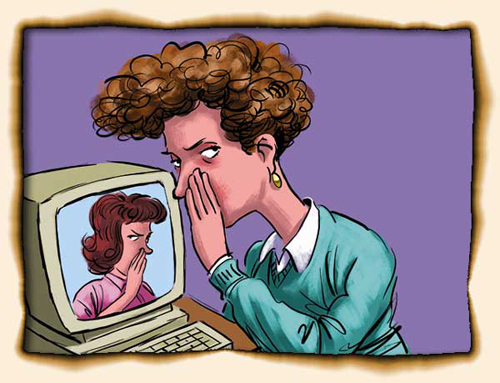Rumors
Social networking has caught the world by storm. Today it has impossible connected with a loved one's on the other side of the world, show relatives pictures in a different time zone, or find that long-lost friend from childhood. Sites like Facebook, MySpace, and Twitter are extremely popular as it makes communicating with peers effortless. These sites give users a sense of belonging and closeness as friends connect through wide circles otherwise known as networks. With the click of the mouse information is posted then re-posted (shared) and so on and so forth. This can form an effect similar to the game "Telephone". Information is shared and passed along until it becomes so distorted it hardly resembles the original message. Information whether positive or negative has a tendency to spread like wildfire. When added onto a social networking site this can make the news spread even faster. Considering the role of the Internet, an individual may see several interactions from several different sources, and when these are received, individuals may assume whatever is being said must be true.
The most known social network rumors include many celebrity deaths, and falsities about Facebook changing its platform, where members' would be obliged to pay. There have been numerous incidents where false information spread across the Internet, resulting in serious consequences. One example is when an impostor posing as the Russian interior minister sent a fake tweet stating the Syrian president had been killed. This rumor drove up crude prices to $1 before traders caught on to the hoax. Another example is when the NASDAQ stopped the trading on Google shares after a report leaked onto social media sites via shares and tweets, resulting in a $22 billion plunge in Google's market "take over" ("Misuse of social media could wreak havoc, warns World Economic Forum", n.d., p. 1)
By adding information to a social network site, it becomes visible to a very broad pool of people. Each person that sees this information can then share it amongst their own network of friends and soon it has spread everywhere. The reason behind the rapid spread of information is simply the fact that members are sharing content to a larger audience than if shared in person. "An increasingly connected world where social networking has made us all news sources, that means missteps and misinformation get issued – and repeated – more quickly than ever" ("The Commander : Social Media Negatively Influences News Sources and Spreads Incorrect Information", n.d., p.1) Basically, with social networks being a hub of information sharing, people generally do not think twice about what is shared. Sharing information takes only a second, and is then quickly sent on its way through different social circles. Each member of a social network has a circle of friends, associates and acquaintances, in other words an audience. Each "audience" is connected through various people. This creates one huge audience. This is the reason information spreads so quickly. These sites were not created to determine the accuracy of information shared by its members. This leaves a enormous opportunity for false information to be shared and spread until eventually it stops.

Social networking sites all have pros and cons. A few of the benefits of social networking are making connections on both a personal and business level. For professionals and students, social network sites allow users to develop networks of comparable people. Students find other students to share research or ideas. Professionals find common associates and potential customers, business contacts, or even business partners. Social networking increases the limits of what sort of connections individuals can make in life. Businesses and organizations have a huge opportunity to exchange information and reach potential clients and members. Another positive effect of social networking is the impact on students and academic performance. Students are able to discuss school work, collaborate with peers and provide help to other students via social networking. Of course, on the other hand, many students are easily distracted by the use of social networks. This causes students to become less productive and makes studying more difficult.
The Internet and social networking is very promising. It creates a common ground. The use of social networks and the Internet is also creating allegiances in society that were once divided due to geography. Social networking has paved the way for globalization and international communication. This has allowed communication and globalization the ability to thrive when applied to collective, academic, and business-related situations.





